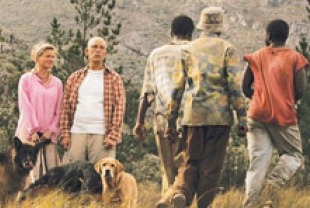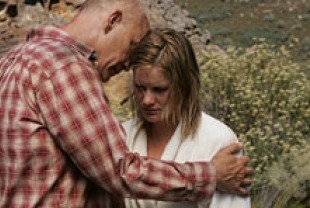David Lurie (John Malkovich) is a 52-year-old professor of Romantic Literature at Capetown University in post-apartheid South Africa. This twice-divorced man proudly follows his sexual needs, seeing a prostitute when in the mood and then seducing Melanie (Antoinette Engel), a pretty mixed-race student. David is stunned when she and her angry father bring a complaint against him and he has to appear before an academic committee. Sensing that the deck is stacked against in him in what he calls "a witch hunt," he pleads guilty to the charges but strongly refuses to apologize or repent for his indiscretion. Forced to resign, David decides to visit his lesbian daughter Lucy (Jessica Haines), who lives on a farm in the rugged mountains where she sells flowers in a village market. She is assisted in her work by Petrus (Eriq Ebouaney), an industrious black man who lives in a shed nearby.
But one day when Petrus is away, David and Lucy are confronted by three black men who knock him out, rape her, and shoot several dogs she has rescued from a kennel. When he wakes up locked in the bathroom, the three intruders set him on fire; he suffers burns on his neck and head before he douses himself with water from the toilet. Afterwards, David feels guilty for not having been able to defend his daughter. As time passes, he is perplexed by Lucy's refusal to seek justice by reporting the rape or to satisfy her rage by revenge.
In order to draw closer to her, David volunteers to work at the animal clinic with one of her female friends. He is sickened by the loneliness of the dogs who await being put down. His newly discovered compassion is given a jolt when he finds out that one of the three men who raped Lucy and robbed her of many of her possessions is a relative of Petrus. The African, who has now married, claims that the whole incident should be put in the past.
David returns to Capetown to discover that his apartment has been vandalized. He goes to Melanie's house and makes amends for the distress he caused them and then returns to his daughter's farm. Pregnant from the rape, Lucy has decided to keep the baby and to give the land to Petrus except for her house. She refuses to leave South Africa and believes that she and her baby can play a role in the shaping of a new future for the country where blacks and whites will live and work side by side.
Disgrace is a bold and adventuresome screen adaptation of the acclaimed 1999 novel by Nobel Prize winner J. M. Coetzee. It is a difficult and disquieting work to watch but the spiritual themes make it worth the effort. Be advised that most of the violence happens off-screen. The filmmakers do not slight the weightiness of the novelist's themes which include racism, sexism, cruelty to animals, and the hope for reconciliation in post-apartheid South Africa. Malkovich gives a bravura performance as David, a racist and self-absorbed man who is brought low by his disgrace. But the emotional core of the drama is movingly conveyed by Australian actress Jessica Haines as the self-sacrificing, generous, tolerant, and ever hopeful Lucy. She is willing to stake her life and her property on the possibility of a new South Africa where co-operation between the races becomes a reality. Lucy is a true spiritual heroine who acts from the heart.
Special features on DVD include interviews with the cast and crew and a "Making of" featurette.

